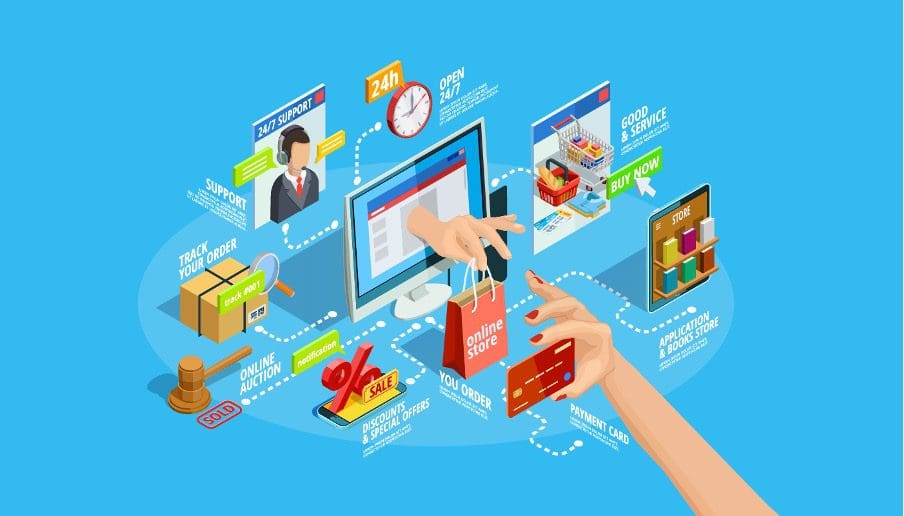Marketplaces have revolutionized retail and online sales transactions between thousands of buyers and suppliers. The trend toward automation and digitalization has further accelerated, transforming sales through B2B and B2C marketplaces. That’s why it’s worth thinking about. Today, anyone can build a marketplace.
Revenue from e-commerce will grow to $5.4 trillion by 2022. Also, by 2025, the CAGR (Compound annual growth rate) of sales in retail e-commerce may reach +6.29% globally. And it is marketplaces that have already become a key element of trade and business development for a lot of manufacturers and suppliers.
Moreover, if previously a significant market share was occupied by large trading platforms, aggregating many third-party suppliers, then from 2020-2021 there is a growing trend among large companies, due to which entrepreneurs prefer to build a marketplace. More and more businesses are realizing the benefits of digitizing their business through online marketplaces.
Businesses especially appreciate the ability to build a marketplace with low-code and using the constructor method in an accelerated mode. What is noteworthy, such a method allows you to quickly build a marketplace in a basic version at the first stage. And this MVP can be further scaled and refined, adding all the new options you need.
Today you can build a marketplace with the help of many companies whose team provides the full cycle – from helping to compose the functional requirements of the future marketplace and developing it to implementation, followed by technical support and even onboarding (adaptation) of users to work with the new marketplace. Many large corporations, even before the growing popularity of this trend, appreciated the advantages of implementing B2B or B2C marketplaces.
Even today, such platforms for the digitalization of trade and procurement activities enable top enterprises from various industries:
- Optimize purchasing and save on supplies – thanks to corporate marketplaces, e-shops for small purchases.
- Take sales to a new level and expand market coverage by uniting the trading operations of industry companies on a single marketplace with order automation and additional monetization capabilities.
- Advantageously and quickly sell even illiquid commodity items and raw materials through a specialized illiquidity store. Why build a marketplace? Such a B2B marketplace is especially relevant for large companies with production cycles.
- Quickly and efficiently carry out the digitalization of offline business. Thanks to the introduction of a marketplace, it is possible to bring online and automate work processes, adjusting the business to the requirements of the modern digital economy. Among other benefits, such a move will grow the liquidity and capitalization of the company.
Real experience
Among companies that have already incorporated their own marketplaces into their business, there are several illustrative cases. The B2B marketplace makes it possible to significantly accelerate three-way deliveries, automate transactions, and more accurately forecast delivery volumes. While the product catalog and personal accounts with personalization for each dealer or distributor improve customer service.
And the implemented electronic document flow reduces the time for approving new documentation, after which all transactions are now possible to conduct automatically and in “one window” mode, without leaving the marketplace. This will be a real breakthrough regarding saving employees’ time and savings for both large enterprises and startups. In turn, in-house marketplaces also make it possible to speed up and increase the efficiency of procurement activities.
Today, the B2B marketplace can be scaled up to an impressive size, including the ability to make purchases on the international market and the availability of many related services for entrepreneurs.
The functionality of systems can be gradually expanded depending on the needs of users and marketplace owners. In this case, the entrepreneur receives a sufficiently powerful platform that can cope with increasing loads. And by adding new options, the marketplace will continue to work without the need to “freeze” at the time of the update.
For both sales and purchases, the introduction of in-house marketplaces is accompanied by automated sales, purchasing and logistics processes. As well as secure payments, integration with popular services and accounting systems, and other important options necessary for a modern business.
Build a marketplace: secrets that will allow you not to spend too much
The key ingredients for successful implementation of a modern marketplace:
- Specialization – initially give preference to an experienced developer, with a proven track record. When there is a concentration on serious products for e-commerce and procurement, it is possible to implement truly effective and useful products for the marketplace. These are B2B and B2C marketplaces able to handle impressive daily workloads, thousands of users with different access rights and personalized personal accounts; hundreds of suppliers, etc.
- Fast implementation. Why spend a fortune to build a marketplace as a custom project from scratch, waiting months or even years? The modern solution is to develop a B2B or B2C marketplace. Basic MVP can build a marketplace in 2 to 4 months with the ability to add necessary options – at any stage of implementation. At the same time, the marketplace will already be working and reaching a break-even point.
- Flexible development. If we talk about the accelerated implementation of a marketplace through an MVP, experts also highlight another necessary advantage – the ability to quickly test various business hypotheses. The adaptive approach allows to further save the company’s budget, as opposed to months-long and expensive development “in-house”, while the modular architecture of the marketplace will allow to finalize the basic version and test new hypotheses with minimal expenditure of time and money. With clumsy custom systems, this was hard to imagine before.

Separately, we should highlight the so-called openness of the marketplace, the ability of the system to integrate with third-party accounting programs: ERP systems, as well as CRM systems, logistics, payment, and other third-party systems. In today’s world of digitalization and workflow optimization, you simply cannot do without this capability.
By implementing their own marketplace, hundreds of companies have already been able to increase and digitize sales, unify trade industry operations on a single platform, as well as accelerate purchases and save up to 5% of their budget on deliveries. And choosing the right vendor to quickly and efficiently build a marketplace can save significantly.
Retail, like wholesale, is changing not just fast, but fast. To keep your market niche, you need to adapt to current realities and choose fast solutions. Developing your own B2B or B2C marketplace will allow you to do this in the most productive and profitable way.

